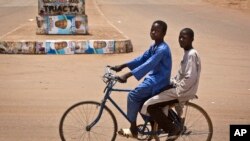Young voters may be the key demographic in Nigeria’s fifth democratic elections Saturday, as they are less likely to vote along regional and religious lines.
The official campaigns with politicians traveling by road and air between towns and cities in Nigeria’s 36 states ended last week. Online however, the campaigns continue with the parties trying to publicize their own achievements while making the other side look bad.
Online, the parties show their true face, says Uchechi Agbaraji, a 23-year-old manager of a web platform who has been following the political debate on blogs and Facebook posts.
“It makes it very interesting really. It made it easier for me to decide who to vote for," said Uchechi.
While Nigerian President Goodluck Jonathan has an aggressively-styled campaign with the word “Forward” printed on election posters and in the header of his Twitter account, the Twitter profile of his opponent, Muhammadu Buhari, is more subdued.
Buhari's personal tweets are signed GMB, short for General Muhammadu Buhari, who has a team flooding Twitter and Instagram with his images and quotes, and taking time to interact with the audience, says 31-year-old Tunji Alao.
“If you look at the two accounts on Twitter and Facebook, theirs are more interactive. I think they have a very robust team full of a lot of young technology people that have technology backgrounds and everything. They have been able to engage their electorate more, especially young people," said Tunji.
In Nigeria, two-thirds of the population is under 30. Some run their own online companies or start-ups. They live in big cities like Lagos and Abuja and they spend a big portion of their time on social media sites like Facebook and Twitter, or on blogs and smart phone apps.
They are also the targets of the parties’ online campaigns. Younger voters are more likely to look beyond the longstanding regional, religious and ethnic lines that traditionally divide the electorate in Nigeria.
The parties’ online campaigns have the potential to sway the opinion of some people, says Rotimi Dada, a 24-year-old online entrepreneur.
He says it depends on how you use social media.
“Just like any other service or technology you can use it either to the benefit or the disadvantage of others; but, it depends on the reader and how you interpret what you read. That’s really the point of it," said Rotimi.
All of this is new to Nigeria and it might not affect the electorate. It is up to the voters to decide which information to take and they tend to seek information from the side they support.
Rotimi Dada, however, sees a clear difference in the use of social media compared to the elections four years ago.
“Unlike 2011, people are using it a whole lot more now because data services are cheaper than then. There are a whole lot more devices you can use to connect from anywhere. You don’t have to be depending on lights for example, on electricity, which is really bad here. You can just simply use your phone or tablet. Right now, the interactivity we have now, it’s more than then and tomorrow is going to be really interesting from what I can see," said Rotimi.
Rotimi Dada is the founder of Voicebox of Nigeria, a service that connects users with the news. You log on to the website with your Facebook or Twitter account and can chat with people and get news from any part of the country, provided there are users online. The site will be launched on Saturday, when the elections are held.
“You get to see that finally there’s a medium for us to know what these political parties are doing in other states that we haven’t been to. Like me now, I haven’t been to Niger State. If I want to know what’s going in Niger State all I have to do is type Niger State on Twitter and I get to see what both sides have to say about the states. That’s transparency there already. In my opinion that’s transparency right there," he said.
In Nigeria, rumors of rigged elections, stolen ballot boxes and votes have flawed every election since military rule ended 16 years ago. Rotimi Dada hopes Saturday’s vote will see a difference with the possibility of sharing information from across the country.




